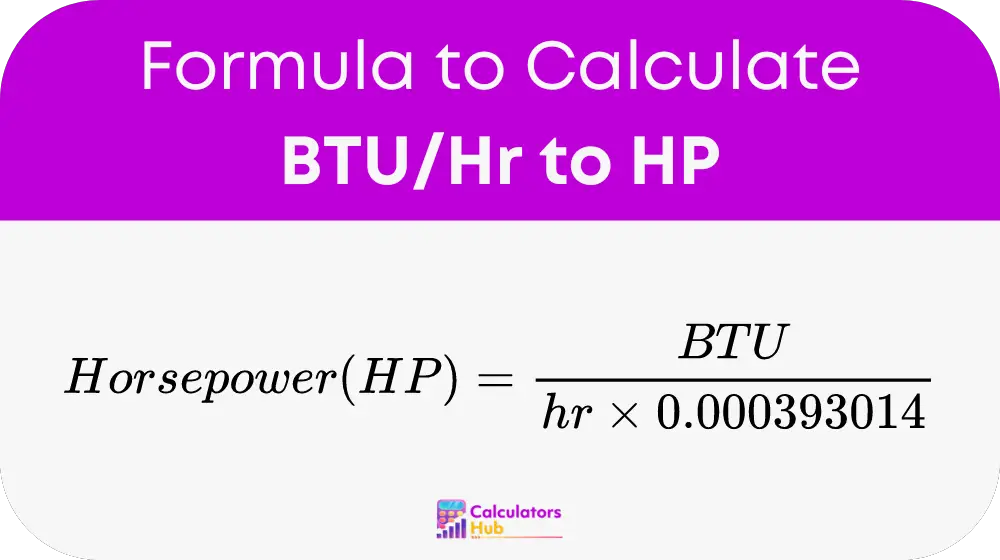The BTU/Hr to HP (Horsepower) Calculator is a tool used to convert energy output, measured in British Thermal Units per hour (BTU/hr), into mechanical horsepower (HP). This conversion is crucial in applications where thermal energy and mechanical energy are both considered, such as in engines, heating systems, and industrial equipment.
Horsepower is a unit of power often use to describe the power output of engines, while BTU/hr is a measure of heat energy. By converting BTU/hr to HP, the calculator helps users understand how much mechanical power is generated or required based on a given rate of energy consumption. This is useful for professionals in the HVAC industry, engineers, and those managing industrial machinery.
Why You Need a BTU/Hr to HP Calculator
- Energy Comparisons: This calculator helps compare the thermal energy (BTU/hr) with mechanical power (HP), making it easier to understand how much energy an engine or system generates.
- System Sizing: The calculator helps ensure that machinery or HVAC systems are correctly size for their energy requirements and power outputs.
- Cost Efficiency: By understanding the conversion between BTU/hr and HP, users can make more informed decisions about energy usage, fuel costs, and equipment selection.
Formula
To convert BTU/hr to horsepower (HP), the formula is as follows:

Variables:
- Horsepower (HP): The resulting power output, measured in horsepower.
- BTU/hr: The rate of energy consumption or production, measured in British Thermal Units per hour.
- 0.000393014: This is the conversion factor, based on the fact that 1 horsepower is equivalent to 2,545 BTU/hr.
This simple formula allows users to convert thermal energy into mechanical power, which is especially useful when working with engines, HVAC systems, or heating equipment.
Pre-calculated BTU/Hr to HP Conversions
Here is a table with common BTU/hr values and their corresponding horsepower outputs for quick reference:
| BTU/hr (Energy Rate) | Horsepower (HP) |
|---|---|
| 5,000 BTU/hr | 1.97 HP |
| 10,000 BTU/hr | 3.93 HP |
| 25,000 BTU/hr | 9.83 HP |
| 50,000 BTU/hr | 19.65 HP |
| 100,000 BTU/hr | 39.30 HP |
| 250,000 BTU/hr | 98.26 HP |
| 500,000 BTU/hr | 196.52 HP |
This table helps users quickly determine horsepower values based on common energy rates, saving time and ensuring that energy and power calculations are accurate for various applications.
Example
Let’s work through an example to better understand how the BTU/Hr to HP Calculator works:
Scenario: You want to convert 150,000 BTU/hr into horsepower to evaluate the energy output of a heating system.
- Step 1: Identify the known value:
- BTU/hr = 150,000
- Step 2: Use the formula:Horsepower (HP) = BTU/hr × 0.000393014
- Step 3: Apply the value:Horsepower (HP) = 150,000 × 0.000393014 Horsepower (HP) ≈ 58.95 HP
In this case, 150,000 BTU/hr is equivalent to approximately 58.95 horsepower. This conversion is essential for understanding the power output of the system.
Most Common FAQs
Converting BTU/hr to horsepower is essential when comparing thermal energy output to mechanical power. This is especially important in industries where both forms of energy are relevant, such as in HVAC systems, engines, and power generation equipment. Understanding this conversion helps in designing and sizing systems for efficiency.
The conversion from BTU/hr to HP is highly accurate as long as the correct conversion factor (0.000393014) is used. However, real-world factors like efficiency losses in engines and systems may affect the actual power output, but the conversion provides a solid foundation for theoretical calculations.
Yes, the BTU/hr to HP calculator can be use for both heating and cooling systems, as it converts thermal energy into mechanical power. It is widely applicable in systems where energy conversion plays a role in system performance, including HVAC systems, power generation, and industrial equipment.